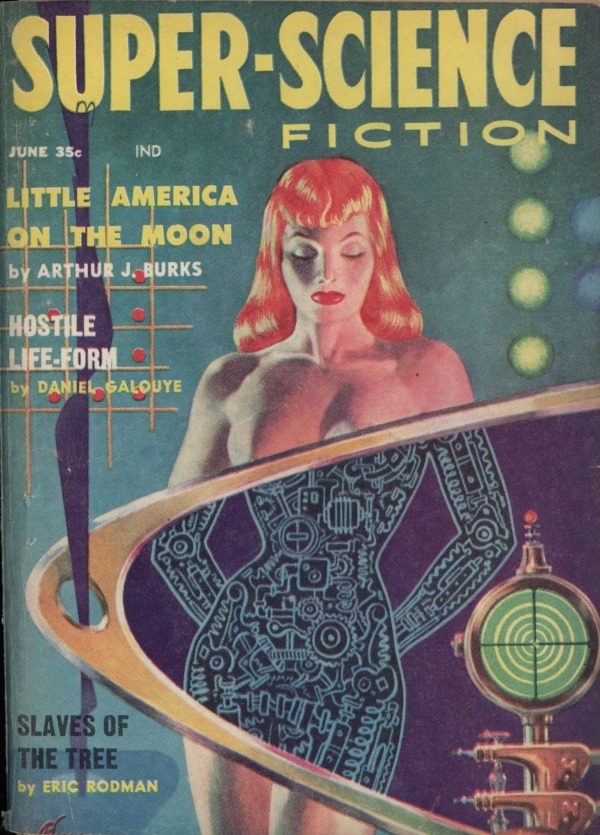Blog
Super-Science Fiction v2n4 (June 1958)
In which I read old SF mags with interesting covers and writers I recognize:
- Cover, by Kelly Freas: No story is related to the redhead full of gears and circuits, which is a damn shame. ★★★★☆
- Hostile Life Form, by Daniel L. Galouye (aka Daniel F. Galouye): Vicious native animals kill a colony, so why not adopt the cute animals that attack the hostile ones? Oh, because nothing's that easy. Saw the ending coming a mile away but it's a good one. ★★★★☆
- Little America on the Moon, by Arthur J. Burks: Awful. Implausibly bad Lunar colony, tedious and sexist 1950s psychology, Manifest Destiny in space, avoid. ★☆☆☆☆
- Slaves of the Tree, by Eric Rodman (aka Robert Silverberg): 1950s genetics aside (with a handwavy explanation), an excellent story until two train-wreck writing failures. The under-explained but creepy Terran "Colonial Force" and their Darwinian expansion plan is wonderful for backstory. I had a consistent explanation for the protagonist Rayner's behavior, but also suspected there was no way a story written in the 1950s would even hint at a gay man as a character. Well, spoiler time. First, mouseover for spoiler. So what were readers of the '50s supposed to think about him? Second, psychic forces, ugh. John Campbell was a lunatic and a troll. There's pheromonal or other mechanisms that could be used, not this nonsense word denoting nothing real. I'm so close to loving this story, but a sane editor needed to beat the stupid out of it. ★★★☆☆
- Look to the Stars, by Scott Nevets: A space news article about a "Cat Eye" light amplifier for telescopes; I can't find anything useful about it. And a supposed catalyst for an endlessly-flying upper-atmosphere rocket; I find the chemistry dubious and it certainly didn't become a thing. But keep in mind Sputnik had only launched the year before this, so this was some cutting-edge speculation here. (nil)
- Special Aptitude, by R. H. Hardwick: This is what passed for 1950s pornography. They were sad little critters without PornHub. ★☆☆☆☆
- Science Shorts, by Edgar P. Straus: What seems to be the announcement of the Nançay radio-telescope (NRT), which took some years after this article to actually be productive. 3D TV announced! Yeah, the eternal bullshit product nobody wants. (nil)
- Frontier Planet, by Calvin M. Knox (also aka Robert Silverberg): Killin' natives is so good, it makes you want to stay and do farm chores and then kill more of 'em. Garbage story, which is a shock from Silverberg. Was he drunk? Did he lose a bet? Did John Campbell hold a gun to his head like Heinlein's "Sixth Column"? Avoid. ★☆☆☆☆
- No Planet is Safe, by Harlan Ellison: "Each trip got worse. It seemed Mother Nature hated Man, and had set each alien world as a trap for him. No matter how peaceful the worlds had seemed, they had each held many hidden dangers, into which the Earthmen had stumbled." I don't buy the ending, it's a shaggy planet story if there ever was one, but Harlan never fails to amuse. ★★★★☆
- One to a Customer, by Theodore R. Cogswell: Terrible people making stupid choices. Sadly not at enough length to be worth it. ★★☆☆☆
- The Spacistor: More quaint science news. A now-obsolete improvement to the first transistors, explained breathlessly. (nil)
Reelin in Saturday Music
Debugging Pascal
Having a spare day to actually work on what I want, I get back into my Pascal adventure, and I'm blocked by inobvious bugs.
Thanks to Sierra breaking gdb (unless you disable SIP entirely, which I'm not going to do), Lazarus can't run ggdb, so forget about GUI debugging. I've tried all the code-signing, rebooting suggestions, none of that works.
I'm not a giant fan of the debugger, but even caveman Mark needs a backtrace sometimes. Happily, lldb works from the command line:
lldb -o "breakpoint set -n fpc_raiseexception" -o run foo.app
Then at the lldb prompt after a crash, type 'bt' for backtrace, 'cont' to carry on with the usual exception handling. Most of the lldb tutorial works the same.
Twitter Shuts Down Abusive Account for 11 Minutes
Shut down that account forever, Jack. You know it's for the best. Twitter Shuts Down Abusive Account for 11 Minutes
Halloween
"I love Halloween, the one time of year when everyone wears a mask, not just me. People think it's fun to pretend you're a monster; Me, I spend my life pretending I'm not. Brother, friend, boyfriend, all part of my costume collection. Some people might call me a fraud, I prefer to think of myself as a master of disguise."
—Dexter, S1E4 "Let's Give the Boy a Hand"
Haunted by the Past Tuesday Music
- The Lady Wore Black, by Queensrÿche
- Don't Fear the Reaper, by Blue Öyster Cult
- Great Old Ones, by Darkest of the Hillside Thickets
- Roland the Headless Thompson Gunner, by Warren Zevon
- No Exit, by Blondie
- Zombie Prostitute, by Voltaire
- The Stranger, by Billy Joel
- The Curse of Millhaven, by Nick Cave & the Bad Seeds
- Bloodletting, by Concrete Blonde
- Transylvania, by Nox Arcana
- Halloween After Dark, Apple Music playlist
micro.blog photo post
Obligatory micro.blog photo test. Can't get it to show up as a share action from Camera+.
I have better coffee at home, but I like a trashy double tall hazelnut latte when I'm out.

☕️
Samurai Sunday Music
- Paradox, by Hotei
- Electric Samurai, by Hotei - source of the Battle Without Honor or Humanity from Kill Bill
- Vocalo-Zanmai, by WagakkiBand
- Yasouemaki, by WagakkiBand
- Shikisai, by WagakkiBand
- Metal Resistance, by BABYMETAL
Movie Policy
My movie policy is "with rare exceptions, don't watch adaptations or sequels".
Movie adaptations of books are mostly horrible. What I read a book for is complex new ideas, setting, plot, very slightly writing style and characterization. Those are almost impossible for movies to capture; they can have attractive sets, cinematography, and soundtrack, and adequate hitting-marks-and-saying-lines by the walking meatsticks we call "actors", but there simply isn't time for a complex plot or any exploration of an idea in a film, and few of them even try.
Competent SF/F/H adaptations are almost nonexistent:
- 20,000 Leagues Under the Sea (1954)
- "It's a Good Life" (1961)
- The Man Who Fell to Earth (1976)
- Altered States (1980)
- A Clockwork Orange (1981)
- "Who Goes There?"/The Thing (1982)
These are not competent, despite what some fanlings will scream in all caps:
- Solaris (1972) and Solaris (2002), both are slow, tedious, and almost unwatchable. Stanislaw Lem's hard to film, but these are terrible.
- 2001 (1968) was a collaboration, but the book has an actual ending.
- The Shining (1980) is beautifully-shot, perfectly-acted nonsense which loses everything interesting from King's book.
- Every Philip K Dick adaptation. I didn't hate Screamers (1995) or Radio Free Albemuth (2010), but neither are great films.
- Watchmen (2009) and Batman: The Killing Joke (2016) tried, and about half of each succeeds perfectly, wrecked by the other half being trash.
- Pirates of the Carribean 2+, which had sometimes spectacularly good ideas and amazing visuals, wrecked by Disneyfication, incoherent plots, bit part actors who aren't competent for limelight, and Depp's Mick Jagger impersonation wearing thin fast.
- Harry Potter. Films 1-5 are fun trash, then 6-8 are grim, dull, melodramatic trash. I quite like the books, even the grindingly slow later ones, but these aren't quality adaptations.
Competent genre adaptations (I don't read romance or no-genre "literature", so I can't comment on those), I can think of:
- The Godfather (1972), and the movie is far better than the book.
- The Wages of Fear/Sorcerer (1977) perhaps, but I haven't read the French novel, only seen the French movie; Sorcerer has deeper characters and literally explosive tension.
- Lonesome Dove (1989)
- "Rita Hayworth and the Shawshank Redemption"/The Shawshank Redemption (1994)
- Fight Club (1999)
- American Psycho (2000) and The Rules of Attraction (2002), but the Less Than Zero (1987) "adaptation of a title" almost cancels out both positive adaptations.
- Man on Fire (2004) is better than the book, dumping the trick ending of the book helped.
- A History of Violence (2005)
- Jesse Stone: Stone Cold (2005) and all the sequels have done justice to Robert B. Parker's novels, though Tom Selleck is about 30 years older than the Jesse Stone of the books.
- The Girl with the Dragon Tattoo (2009), the Swedish films are pretty close to the books' brooding tone, technophilia, and fucked-up psychologies, and the actors are great for it. NEVER watch American remakes.
Competent sequels are just as rare. After quite a while thinking on it, I have:
- Samurai II: Duel at Ichijoji Temple (1955)
- Sanjuro (1962)
- The Good, the Bad, and the Ugly (1967)
- The Godfather: Part II (1974)
- Dawn of the Dead (1978)
- Invasion of the Body Snatchers (1978), also an adaptation, but the book is terrible.
- The Empire Strikes Back (1982)
- Star Trek II: The Wrath of Khan (1982)
- Day of the Dead (1985)
- Aliens (1986), but only barely: It's written by a pack of syphilitic monkeys compared to Dan O'Bannon's perfect Alien, it's not even a horror movie, it's just another of James Cameron's trashy Vietnam-in-space flicks. Still, you take what you can get.
- The Killer (1989), not technically a sequel to A Better Tommorrow (1986), but close enough.
- Terminator 2: Judgement Day (1991)
- New Dragon Inn (1992), I found the original 1967 film grim, dull, and unloveable despite great swordfights, the remake/sequel is fun while still menacing and having even better swordfights.
- Léon: The Professional (1994), not technically a sequel to La Femme Nikita (1990), but close enough.
- Hellboy II: The Golden Army (2008), considerably better than the first, and more like the comics.
- The Dark Knight (2008)
- While I enjoyed Guardians of the Galaxy Vol. 2 (2017) as fun trash, it's not as good fun trash as the first.
I bring this up because of jwz's unhappy review of Blade Runner 2049. It's like they did everything I hate in films. And jwz likes Blade Runner, I barely tolerate it as moving wallpaper.
Philip K Dick's "Do Androids Dream of Electric Sheep" is vastly more interesting than the very pretty but vapid Blade Runner, and the new one is a sequel to an adaptation, so it's a hall of mirrors reflecting horrors. All the philosophy and setting of DADOES is thrown away for visual flair & a nice Vangelis album, which you can listen to without a movie talking over it.
Why in Blade Runner are there artificial animals & people? Why is the city so empty except for little gaggles of people? Why is empathy their test for humanity? None of this is even hinted at. So the movie is just a psychopath murdering and raping what appear to be human slaves who try to run or can't quite pass his test.
So they doubled down on pretty nonsense instead of background or plot, and introduced stupid new ideas. The only good thing Jared Leto has ever done was American Psycho, especially the Huey Lewis scene. Every use of him in any other film should just be a remake of that scene.
